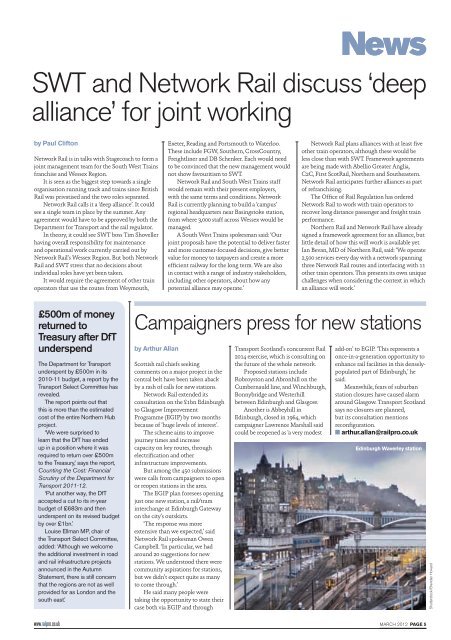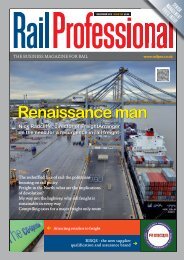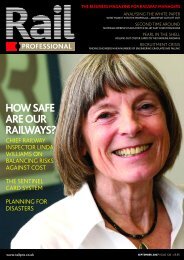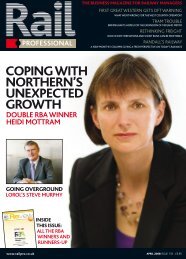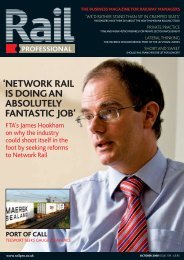View as PDF - Rail Professional
View as PDF - Rail Professional
View as PDF - Rail Professional
Create successful ePaper yourself
Turn your PDF publications into a flip-book with our unique Google optimized e-Paper software.
SWT and Network <strong>Rail</strong> discuss ‘deep<br />
alliance’ for joint working<br />
by Paul Clifton<br />
Network <strong>Rail</strong> is in talks with Stagecoach to form a<br />
joint management team for the South West Trains<br />
franchise and Wessex Region.<br />
It is seen <strong>as</strong> the biggest step towards a single<br />
organisation running track and trains since British<br />
<strong>Rail</strong> w<strong>as</strong> privatised and the two roles separated.<br />
Network <strong>Rail</strong> calls it a ‘deep alliance’. It could<br />
see a single team in place by the summer. Any<br />
agreement would have to be approved by both the<br />
Department for Transport and the rail regulator.<br />
In theory, it could see SWT boss Tim Shoveller<br />
having overall responsibility for maintenance<br />
and operational work currently carried out by<br />
Network <strong>Rail</strong>’s Wessex Region. But both Network<br />
<strong>Rail</strong> and SWT stress that no decisions about<br />
individual roles have yet been taken.<br />
It would require the agreement of other train<br />
operators that use the routes from Weymouth,<br />
Exeter, Reading and Portsmouth to Waterloo.<br />
These include FGW, Southern, CrossCountry,<br />
Freightliner and DB Schenker. Each would need<br />
to be convinced that the new management would<br />
not show favouritism to SWT.<br />
Network <strong>Rail</strong> and South West Trains staff<br />
would remain with their present employers,<br />
with the same terms and conditions. Network<br />
<strong>Rail</strong> is currently planning to build a ‘campus’<br />
regional headquarters near B<strong>as</strong>ingstoke station,<br />
from where 3,000 staff across Wessex would be<br />
managed.<br />
A South West Trains spokesman said: ‘Our<br />
joint proposals have the potential to deliver f<strong>as</strong>ter<br />
and more customer-focused decisions, give better<br />
value for money to taxpayers and create a more<br />
efficient railway for the long term. We are also<br />
in contact with a range of industry stakeholders,<br />
including other operators, about how any<br />
potential alliance may operate.’<br />
Network <strong>Rail</strong> plans alliances with at le<strong>as</strong>t five<br />
other train operators, although these would be<br />
less close than with SWT. Framework agreements<br />
are being made with Abellio Greater Anglia,<br />
C2C, First Scot<strong>Rail</strong>, Northern and Southe<strong>as</strong>tern.<br />
Network <strong>Rail</strong> anticipates further alliances <strong>as</strong> part<br />
of refranchising.<br />
The Office of <strong>Rail</strong> Regulation h<strong>as</strong> ordered<br />
Network <strong>Rail</strong> to work with train operators to<br />
recover long distance p<strong>as</strong>senger and freight train<br />
performance.<br />
Northern <strong>Rail</strong> and Network <strong>Rail</strong> have already<br />
signed a framework agreement for an alliance, but<br />
little detail of how this will work is available yet.<br />
Ian Bevan, MD of Northern <strong>Rail</strong>, said: ‘We operate<br />
2,500 services every day with a network spanning<br />
three Network <strong>Rail</strong> routes and interfacing with 11<br />
other train operators. This presents its own unique<br />
challenges when considering the context in which<br />
an alliance will work.’<br />
£500m of money<br />
returned to<br />
Tre<strong>as</strong>ury after DfT<br />
underspend<br />
The Department for Transport<br />
underspent by £500m in its<br />
2010-11 budget, a report by the<br />
Transport Select Committee h<strong>as</strong><br />
revealed.<br />
The report points out that<br />
this is more than the estimated<br />
cost of the entire Northern Hub<br />
project.<br />
‘We were surprised to<br />
learn that the DfT h<strong>as</strong> ended<br />
up in a position where it w<strong>as</strong><br />
required to return over £500m<br />
to the Tre<strong>as</strong>ury,’ says the report,<br />
Counting the Cost: Financial<br />
Scrutiny of the Department for<br />
Transport 2011-12.<br />
‘Put another way, the DfT<br />
accepted a cut to its in-year<br />
budget of £683m and then<br />
underspent on its revised budget<br />
by over £1bn.’<br />
Louise Ellman MP, chair of<br />
the Transport Select Committee,<br />
added: ‘Although we welcome<br />
the additional investment in road<br />
and rail infr<strong>as</strong>tructure projects<br />
announced in the Autumn<br />
Statement, there is still concern<br />
that the regions are not <strong>as</strong> well<br />
provided for <strong>as</strong> London and the<br />
south e<strong>as</strong>t.’<br />
Campaigners press for new stations<br />
by Arthur Allan<br />
Scottish rail chiefs seeking<br />
comments on a major project in the<br />
central belt have been taken aback<br />
by a r<strong>as</strong>h of calls for new stations.<br />
Network <strong>Rail</strong> extended its<br />
consultation on the £1bn Edinburgh<br />
to Gl<strong>as</strong>gow Improvement<br />
Programme (EGIP) by two months<br />
because of ‘huge levels of interest’.<br />
The scheme aims to improve<br />
journey times and incre<strong>as</strong>e<br />
capacity on key routes, through<br />
electrification and other<br />
infr<strong>as</strong>tructure improvements.<br />
But among the 450 submissions<br />
were calls from campaigners to open<br />
or reopen stations in the area.<br />
The EGIP plan foresees opening<br />
just one new station, a rail/tram<br />
interchange at Edinburgh Gateway<br />
on the city’s outskirts.<br />
‘The response w<strong>as</strong> more<br />
extensive than we expected,’ said<br />
Network <strong>Rail</strong> spokesman Owen<br />
Campbell. ‘In particular, we had<br />
around 20 suggestions for new<br />
stations. We understood there were<br />
community <strong>as</strong>pirations for stations,<br />
but we didn’t expect quite <strong>as</strong> many<br />
to come through.’<br />
He said many people were<br />
taking the opportunity to state their<br />
c<strong>as</strong>e both via EGIP and through<br />
Transport Scotland’s concurrent <strong>Rail</strong><br />
2014 exercise, which is consulting on<br />
the future of the whole network.<br />
Proposed stations include<br />
Robroyston and Abronhill on the<br />
Cumbernauld line, and Winchburgh,<br />
Bonnybridge and Westerhill<br />
between Edinburgh and Gl<strong>as</strong>gow.<br />
Another is Abbeyhill in<br />
Edinburgh, closed in 1964, which<br />
campaigner Lawrence Marshall said<br />
could be reopened <strong>as</strong> ‘a very modest<br />
add-on’ to EGIP. ‘This represents a<br />
once-in-a-generation opportunity to<br />
enhance rail facilities in this denselypopulated<br />
part of Edinburgh,’ he<br />
said.<br />
Meanwhile, fears of suburban<br />
station closures have caused alarm<br />
around Gl<strong>as</strong>gow. Transport Scotland<br />
says no closures are planned,<br />
but its consultation mentions<br />
reconfiguration.<br />
n arthur.allan@railpro.co.uk<br />
Edinburgh Waverley station<br />
Shutterstock/Brendan Howard<br />
march 2012 Page 5


